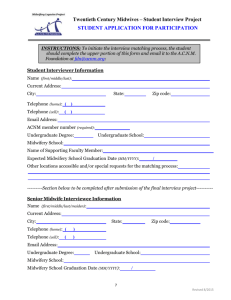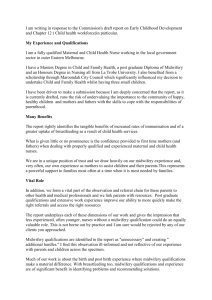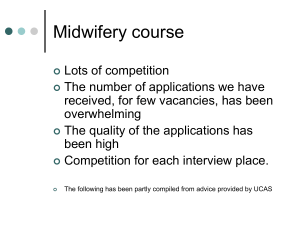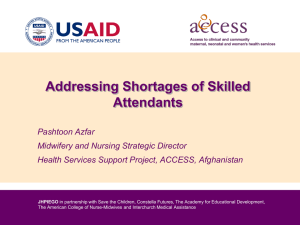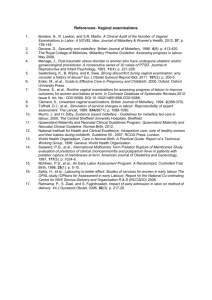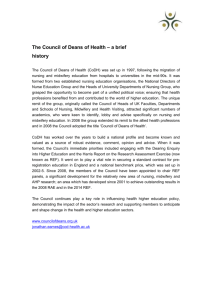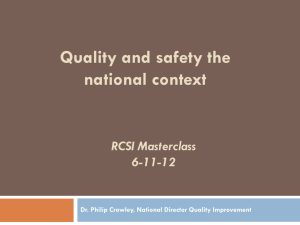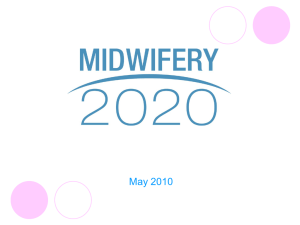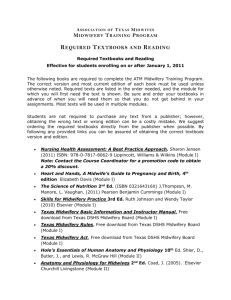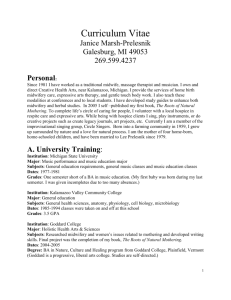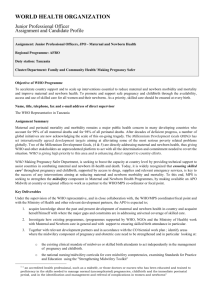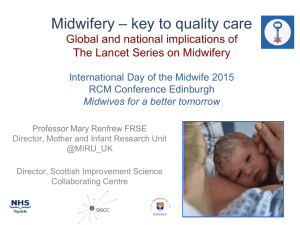MI503 - Activating your university user account
advertisement
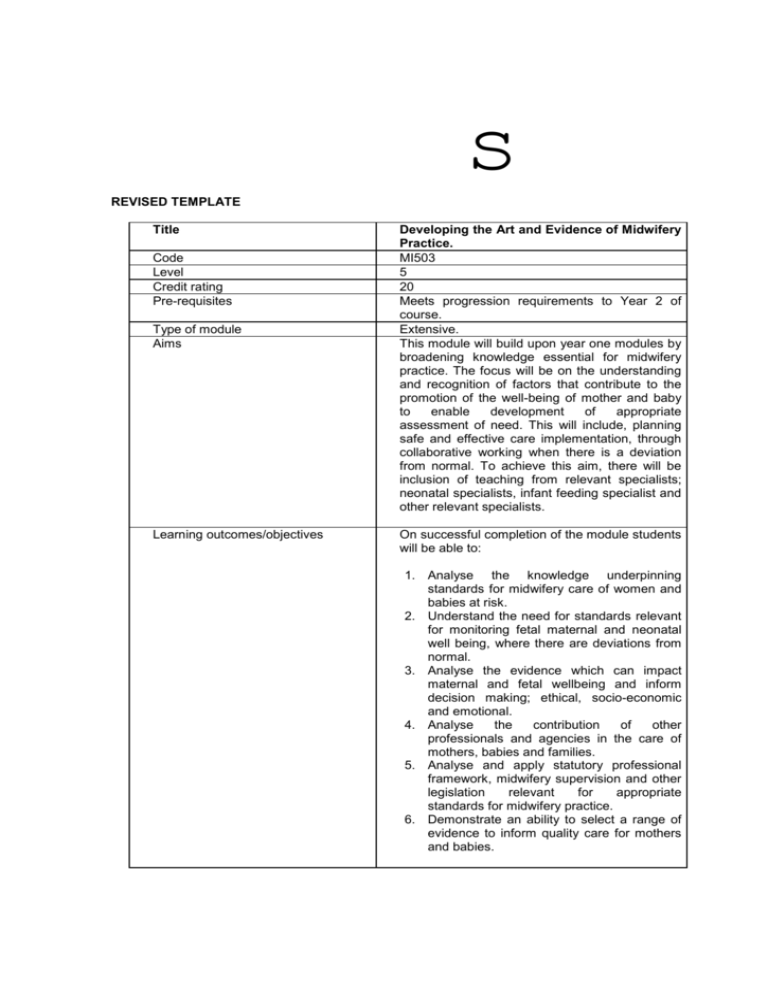
s REVISED TEMPLATE Title Code Level Credit rating Pre-requisites Type of module Aims Learning outcomes/objectives Developing the Art and Evidence of Midwifery Practice. MI503 5 20 Meets progression requirements to Year 2 of course. Extensive. This module will build upon year one modules by broadening knowledge essential for midwifery practice. The focus will be on the understanding and recognition of factors that contribute to the promotion of the well-being of mother and baby to enable development of appropriate assessment of need. This will include, planning safe and effective care implementation, through collaborative working when there is a deviation from normal. To achieve this aim, there will be inclusion of teaching from relevant specialists; neonatal specialists, infant feeding specialist and other relevant specialists. On successful completion of the module students will be able to: 1. Analyse the knowledge underpinning standards for midwifery care of women and babies at risk. 2. Understand the need for standards relevant for monitoring fetal maternal and neonatal well being, where there are deviations from normal. 3. Analyse the evidence which can impact maternal and fetal wellbeing and inform decision making; ethical, socio-economic and emotional. 4. Analyse the contribution of other professionals and agencies in the care of mothers, babies and families. 5. Analyse and apply statutory professional framework, midwifery supervision and other legislation relevant for appropriate standards for midwifery practice. 6. Demonstrate an ability to select a range of evidence to inform quality care for mothers and babies. Content It is expected that the content will be delivered where appropriate, as themed days in conjunction with modules MI225 and MI226. The intention will be to include fetus/baby: Teaching and learning strategies Principles of Governance: e.g. Clinical audit and professional responsibility and accountability. Obstetric Complications, care planning and assessment of risk: e.g. Antepartum haemorrhage, Prolonged labour, malpresentation/malposition, multiple pregnancy, Oligo/polydramnios. Recognition of fetal compromise and the sick neonate: e.g. fetal hypoxia/asphyxia, small for gestational age, long term consequences of birth injuries. The sick neonate and alternative approached to feeding (BFI) Concept of evidence in clinical decision making and evaluation of care: e.g. Principles and theories of clinical audit, nature of evidence and hierarchy of evidence and its evaluation. Breastfeeding complications workshop (BFI) An enquiry based learning approach, through themed study day approach, involvement of user representatives, key note lectures, small group working, case scenarios, studentcentral and small group working. Activity Scheduled Independent Study Practice Total Hours 31.5 120.5 48 200 % 15.8 60.2 24 100 Learning support Indicative reading: Aveyard, H. 2010. Doing a literature review in Health and Social Care. A practical guide. 2nd ed. Berkshire: Open University Press. Beresford, P., S. Croft.,C, Evan and T. Harding. 2000. Quality in personal and social services: the developing role of user involvement in the UK. In: Brayford, D. 2008. Evidence –based care for midwives 2nd Ed. London: Radcliffe. CMACE, 2011.Saving Mothers’ Lives; Reviewing maternal deaths to make motherhood safer: 2006-2008. The Eighth Report of the Confidential Enquiries into Maternal Deaths in the United Kingdom. Wiley-Blackwell. Jones, S. and R. Jenkin. 2004. The Law and the Midwife. Oxford: Blackwell Science. Macdonald, S. and C. Henderson. 2004. Mayes Midwifery: A textbook for midwives. 13th edition. London: Balliere Tindall. Powell, C. 2007. Safeguarding Children and Young People. A guide for Nurses and Midwives. Maidenhead: Open University Press. Weston, A., R. Chambers and E. Boath. 2001. Clinical Effectiveness and Clinical Governance for Midwives. Oxford: Radcliffe Medical Press. Young. A.P. and M. Cooke. 2002. Managing and Implementing Decisions in Health Care. BailliereTindall. Websites RCOG evidence based guidelines: http://www.rcog.org.uk Department of Health: http://www.dh.gov.uk Nursing and Midwifery Council: http://www.nmcuk.org Quality Care Commission: http://www.cqc.org.uk.org Journals British Journal of Midwifery International Journal for Quality Health Care Journal of Obstetrics and Gynaecology Assessment tasks Brief description of module content and/or aims (maximum 80 words) Review a clinical guideline, relevant to midwifery practice and analyse an aspect from this guideline in relation to evidence and quality care (2,500 words). Weighting 100% The focus will be on the understanding and recognition of factors that contribute to the promotion of the well-being of mother and baby to enable development of appropriate assessment of need, planning of care, and safe and effective implementation of care through collaborative working. This module compliments and is complimented by Altered Health in Pregnancy (MI225), Emergencies in Midwifery (MI226) and Developing Competent Midwifery Practice (MI227) Area examination board to which module relates Module team/authors/ coordinator Trimester offered, where appropriate Site where delivered Date of first approval Date of last revision Date of approval of this version Version number Replacement for previous module Field for which module is acceptable and status in that field Course(s) for which module is acceptable and status in course School home External examiner BSc (Hons) Midwifery Kim Hill, Dr Huguette Comerasamy and Annie Rimmer 1&2 Eastbourne 2nd May 2007 December 2008 16th May 2012 4 MI224 Widening the Focus Midwifery Mandatory BSc (Hons) Midwifery – 3 Year Mandatory School of Nursing and Midwifery Denise Campbell 1/9/2010 – 31/8/2014
